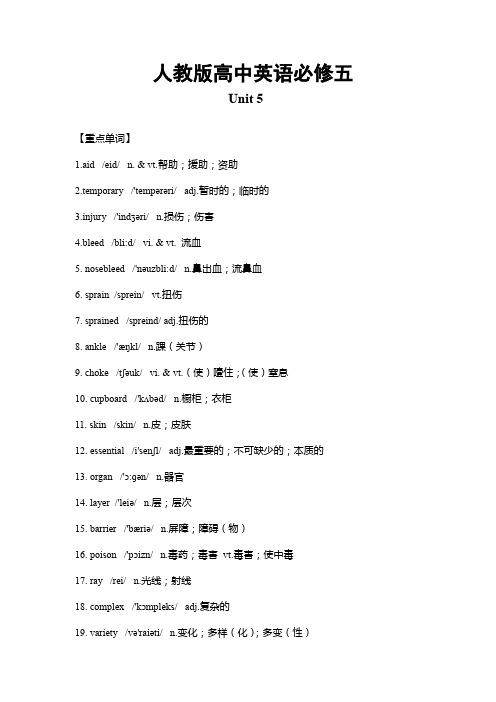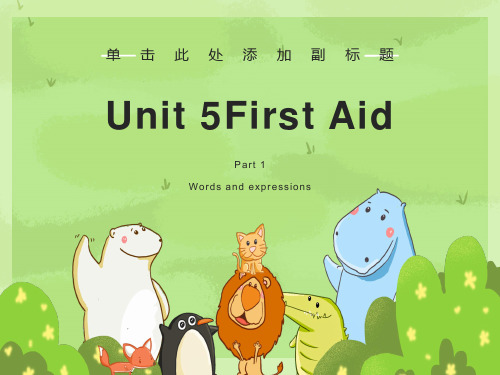UNIT 5 WORDS第五单元单词及知识点
- 格式:pptx
- 大小:156.68 KB
- 文档页数:18

人教版高中英语必修五Unit 5【重点单词】1.aid /eid/ n.& vt.帮助;援助;资助2.temporary /'tempərəri/ adj.暂时的;临时的3.injury /'indʒəri/ n.损伤;伤害4.bleed /bli:d/ vi.& vt. 流血5. nosebleed /'nəuzbli:d/ n.鼻出血;流鼻血6. sprain/sprein/ vt.扭伤7. sprained /spreind/adj.扭伤的8. ankle /'æŋkl/ n.踝(关节)9. choke /tʃəuk/ vi.& vt.(使)噎住;(使)窒息10. cupboard /'kʌbəd/ n.橱柜;衣柜11. skin /skin/ n.皮;皮肤12. essential /i'senʃl/ adj.最重要的;不可缺少的;本质的13. organ /'ɔ:ɡən/ n.器官14. layer/'leiə/ n.层;层次15. barrier /'bæriə/ n.屏障;障碍(物)16. poison /'pɔizn/ n.毒药;毒害vt.毒害;使中毒17. ray /rei/ n.光线;射线18. complex /'kɔmpleks/ adj.复杂的19. variety /və'raiəti/ n.变化;多样(化);多变(性)20. liquid /'likwid/n.液体21. radiation /reidi'eiʃn/ n.辐射;射线22. mild /maild/ adj.轻微的;温和的;温柔的23. mildly /'maildli/ adv.轻微地;温和地24. pan /pæn/ n.平底锅;盘子25. stove /stəuv/ n.炉子;火炉26. heal /hi:l/ vi.& vt.(使)康复;(使)化解27. tissue /'tiʃu:/ n.(生物)组织;薄的织物;手巾纸28. swell /swel/ vi.& vt.(使)膨胀;隆起29. swollen /'swəulən/ adj.肿胀的30. blister /'blistə/ n.水泡vi.& vt.(使)起泡31. watery /'wɔ:təri/ adj.(似)水的32. char /tʃɑ:/ vi.烧焦33. nerve /nə:v/ n.神经;胆量34. scissors /'sizəz/n.(pl.)剪刀35. unbearable /ʌn'beərəbl/ adj.难以忍受的;不能容忍的36. basin /'beisn/n.盆;盆地37. squeeze /skwi:z/ vt.& vi.榨;挤;压榨38. bandage /'bændidʒ/n.绷带39. infection /in'fekʃn/ n.传染;传染病;感染40. vital /'vaitl/ adj.至关重要的;生死攸关的41. symptom /'simptəm/ n.症状;征兆42. label /'leibl/ vt.加标签或标记;分类n.标签;标记43. kettle /'ketl/ n.(水)壶;罐44. pour/pɔ:(r)/ vt.& vi.倒;灌;注;涌45. wrist /rist/ n.手腕46. damp /dæmp/ adj.潮湿的47. sleeve/sli:v/ n.袖子48. blouse /blauz/ n.女衬衫49. tight /tait/ adj.牢的;紧的;紧密的50. tightly /taitli/adv.紧地;牢牢地51. firm/'fə:m/ adj.(动作)稳定有力的;坚定的52. firmly /'fə:mli/adv.坚固地;稳定地53. throat /θrəut/ n.咽喉;喉咙54. ceremony /'seriməni/ n.典礼;仪式;礼节55. bravery /'breivəri/ n.勇敢;勇气56. stab /stæb/ vt.& vi.刺;戳;刺伤57. treat /tri:t/ vt.& vi.治疗;对待;款待n.款待;招待58. apply /ə'plai/ vt.涂;敷;搽;应用;运用vi.申请;请求;使用;有效59. pressure/'preʃə/ n.压力;挤压;压迫(感)60. ambulance/'æmbjuləns/ n.救护车61. scheme /ski:m/ n.方案;计划62. bruise /bru:z/ n.& vi.瘀伤;擦伤【重点短语】1.give / offer / do first aid to sb. 对某人急救2.perform / carry out first aid on sb. 对某人实施急救3.get injured/infected/burned 受伤/感染/烧伤4.save one’s life 挽救某人的生命5.electric shock 触电;电休克6.take off 脱下;(飞机)起飞7.squeeze out 榨出;挤出8.over and over again 反复;多次9.in place 在适当的位置;适当10.put one’s hands on 找到11.present sth. to sb. 赠予/ 给予某人某物12.a piece of jewellery 一件珠宝13.cause / do damage to…. 危害……14.stick sth. to… 把某物贴在……上15.make a difference 有影响【重点句型】1. Burns are called first degree, second degree or third degree burns depending on which layers of the skins are burnt.根据皮肤烧伤的层次分为一度烧伤、二度烧伤和三度烧伤。

Unit 5 Can you e to my party?1. have to 与情态动词的区别情态动词不能单独作谓语,后面必须接动词原形一起构成谓语,have to 也是这样。
情态动词没有人称和数的变化,而且所用的时态也受到一定的限制,但是have to 有人称和数的变化,可用于多种时态中,在一般现在时中,当主语是第三人称单数时,要用has to, 其余人称用have to;一般过去时中用had to;一般将来时中用will have to, 例如:She has to go to school by bus.她不得不乘公共汽车去上学。
If you get ill, you'll have to see the doctor.如果你生病的话,你就得看医生。
2. have to 与must 的区别have to 和must 都有“必须”的意思,那么它们有哪些不同呢?(1) 含义和用法上的区别:have to 强调客观上需要做某事,即表示外界条件的需要不得不做某事,含有“形势逼迫”的意味;must 强调说话者主观上认为必须做某事,含有“主观判断”的意味,例如:My bike was broken on my way to school. I had to walk there.我的自行车在上学的路上坏了,我不得不走路去上学。
(我本来不愿意走路,可是自行车坏了,不想走路也不行。
)We must learn English well.我们必须学好英语。
(主观上有这种想法。
)(2) 否定式的区别:have to 的否定式意为“不必”,must的否定式意为“禁止;不允许”。
因此,以must 开头的一般疑问句的肯定回答为“Yes, 主语+must”,否定回答为“No, 主语+needn't / don't have to”。
例如:---Must I finish the homework now? 我必须现在完成作业吗?---Yes, you must. (No, you needn't / don't have to) 是的,你必须现在完成。


新人教版初三英语Unit5第五单元识点听、说、读、写、译是英语的五个组成部分,它们是一个既有联系又有区别的整体,但是其共同的基础却是词汇这个部分。
下面是小偏整理的新人教版初三英语Unit5第五单元识点,感谢您的每一次阅读。
新人教版初三英语Unit5第五单元识点【重点短语】1.bemadeof由……制造2.bemadein在……制造3.environmentalprotection环境保护4.befamousfor以……而著名5.beproducedin在……生产6.beknownfor以……闻名7.asfarasIknow据我所知8.pickbyhand手工采摘9.sendfor发送10.avoiddoingsth避免做某事11.everydaythings日用品【考点详解】1.madeof由……制(构)成,后接构成某物质的原料。
例:Thisskirtismadeofsilk.这件裙子是用丝绸制成的。
bemadeof/from/upof的区别(1)bemadeof表示制成成品后,仍可看出原材料是什么,保留原材料的质和形状,制作过程仅发生物理变化。
例:Thekiteismadeofpaper.风筝是用纸做的。
(2)bemadefrom表示制成的东西完全失去了原材料的外形或特征,或原材料在制作过程中发生化学变化,在成品中已无法辨认。
例:Thepaperismadefromwood.纸是木头做的。
Butterismadefrommilk.黄油是从牛奶中提炼出来的。
(3)bemadeupof用……构成或组成的,指人、物皆可,指结构成分。
例:Ourclassismadeupofsixgroups.我们班是由六个小组组成的。
2.ItseemsthatmanypeopleallovertheworlddrinkChinesetea.好像全世界的许多人都在喝中国茶。
句型“Itseemsthat…”意为“看起来好像/似乎……”,其中seem是连系动词,意为“似乎;好像”,句型中的it是形式主语,不能用其他代词来替代。

dying adj. 奄奄一息的death n. 死亡The hero’s death made us very sad. 这个英雄的死亡让我们很难过。
16. explain v. 解释,说明Can you explain why you were late? 你能解释一下你为什么迟到吗?【拓展】explanation n. 解释,解说,说明She told the court she would give a full explanation of the prosecution’s decision on Monday.她告诉法庭她会在星期一对原告方的决定作出全面解释。
17.against prep. 相反,反对e.g. No one is against this proposal.没有人反对这个提议。
That's against the law,那是违法的。
辨析:against 与for两者都可表示方向,下图指明了两者的区别:for against●→ ←○ ←● ○→向着(赞同)逆着(反对)e.g. The Prince is making for the open sea while the princess is against. 王子号向着大海驶去,而公主号恰好驶回。
18. go off突然作响When the fire alarm went off, we all moved to the playground.消防警铃突然作响,我们都逃到了操场上。
【拓展】★go off变质= go badI didn’t put the food in the fridge in time so it went off. 我没有及时把食物放进冰箱以致它变质了。
★go off爆炸The bomb was exploded under controlled conditions. 炸弹在受控条件下被引爆了。

九年级unit5单词知识点九年级 Unit 5 单词知识点Unit 5 是九年级英语学习中的一个重要单元,其中包含了许多重要的单词和短语。
本文将以九年级 Unit 5 单词知识点为题,详细介绍该单元中的部分单词和短语的含义和用法。
让我们一起来学习吧!1. thirsty (adj.):口渴的- I'm so thirsty after running for an hour.- Can I have a glass of water? I'm really thirsty.2. countryside (n.):乡村- I enjoy spending my weekends in the countryside.- The countryside is so beautiful with its green fields and fresh air.3. leaf (n.):叶子- The autumn leaves turn red and yellow.- Look at this beautiful maple leaf I found!4. series (n.):系列- Harry Potter is a popular series of books and movies.- This TV show is part of a series that has been airing for years.5. invoice (n.):发票- The store will provide an invoice for your purchase.- Make sure to keep the invoice as proof of your payment.6. establish (v.):建立- The company was established in 1990.- It takes time and effort to establish a good reputation.7. accurate (adj.):准确的- The measurements need to be accurate for the experiment.- Please provide accurate information when filling out the form.8. immigrant (n.):移民- My grandparents were immigrants who came to this country for a better life.- The city has a diverse population due to the large number of immigrants.9. graph (n.):图表- The graph shows the population growth over the past decade.- Let's analyze the data in the graph to understand the trend.10. pollution (n.):污染- Air pollution is a major concern in many cities.- We need to take actions to reduce pollution and protect the environment.11. decrease (v.):减少- The price of the product has decreased by 10%.- It is important to decrease our energy consumption to save resources.12. journalist (n.):记者- The journalist interviewed the famous actor for a magazine article.- Being a journalist requires good communication and research skills.13. distinguish (v.):区分- Can you distinguish between the two identical twins?- It's important to distinguish right from wrong.14. enthusiasm (n.):热情- The students showed great enthusiasm for the upcoming school trip.- She tackled the project with enthusiasm and dedication.15. generation (n.):一代人- My grandparents' generation experienced many hardships during the war.- Each generation brings its own changes and innovations.以上是九年级 Unit 5 单词知识点的部分内容。